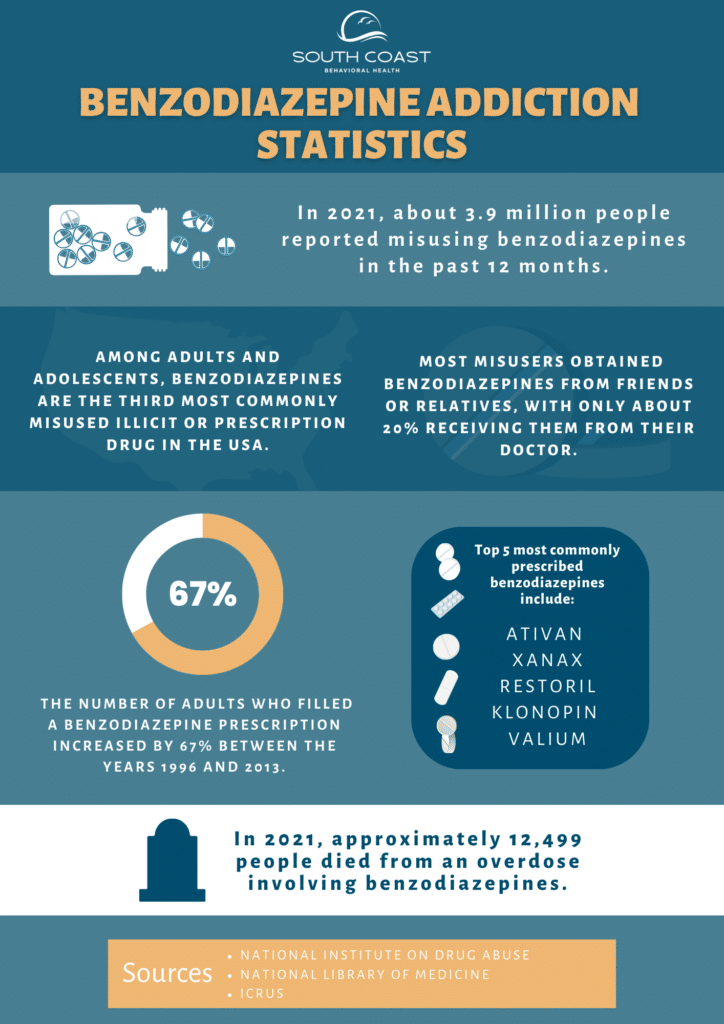Benzodiazepine Addiction
Benzodiazepine addiction, often referred to as benzo addiction, is a growing concern in the realm of substance use disorders and addiction treatment. Individuals struggling with benzo addiction may find themselves trapped in a cycle of escalating use despite the negative consequences it brings to their lives.
Comprehending the complexities of benzodiazepine addiction is vital for successful prevention, intervention, and treatment. This multifaceted disease requires specialized treatment to address the medical, psychological, and behavioral support to help individuals regain control of their lives.

What Is Benzodiazepine Addiction?
Benzodiazepine addiction, often referred to as benzo addiction, involves the misuse and dependence on a class of prescription medications known as benzodiazepines. These commonly abused drugs, such as Xanax, Valium, and Ativan, are often prescribed to alleviate anxiety, panic disorders, sleep disturbances, and seizures due to their calming and sedative effects. While beneficial when used as prescribed, benzodiazepines can be very addictive.
Individuals can become addicted to benzos when they:
- Develop Tolerance: Over time, the body may build a tolerance to the drug’s effects, leading individuals to take higher doses to achieve the same relief or euphoria.
- Experience Withdrawal: Stopping benzodiazepine use can lead to withdrawal symptoms, including increased anxiety and insomnia, which may drive individuals to continue using to avoid these discomforts.
- Seek Recreational Use: Some individuals misuse benzos for their pleasurable effects, leading to addiction as they chase the euphoria produced by these drugs.
It’s important to note that even when prescribed by a doctor, benzodiazepines can be dangerous if misused. Their potential for addiction underscores the need for cautious prescribing practices, close monitoring, and a clear understanding of their risks among both healthcare providers and patients.
Are All Benzodiazepines Addictive?
Benzodiazepines, or benzos, are a class of medications that share similar properties. They target the central nervous system to produce calming and sedative effects. While all benzos are capable of producing tolerance and dependence, some can lead to addiction due to their potency and rapid onset of action. Common benzodiazepines include:
- Alprazolam (Xanax): Known for its rapid onset and potent anxiolytic effects, Xanax is one of the more addictive benzos. It is often prescribed for panic and anxiety disorders.
- Diazepam (Valium): Valium is a longer-acting benzo often used for anxiety and muscle spasms. It has a slower onset but can still lead to dependence.
- Lorazepam (Ativan): Ativan has a moderate onset of action and is prescribed for anxiety disorders and as a preoperative sedative.
- Clonazepam (Klonopin): Klonopin is prescribed for panic disorders and seizure control, but its longer half-life can lead to a smoother withdrawal process.
- Temazepam (Restoril): Temazepam is used for insomnia and has a shorter half-life compared to other benzos.
While benzos share common properties in their mechanism of action on the brain’s GABA receptors, their specific characteristics, such as onset of action and half-life, can influence their addictive potential. Short-acting benzos like Xanax tend to be more addictive due to their rapid effects and subsequent withdrawal symptoms.
Regardless of the specific benzo, long-term effects can lead to physical and psychological dependence, making it crucial for healthcare providers to consider the risks and benefits of prescribing these medications and to monitor their patients.
What Are the Signs and Symptoms of Benzodiazepine Addiction?
Recognizing the signs and symptoms of benzodiazepine addiction is crucial for early intervention and effective treatment. Physical, behavioral, and psychological signs of benzo addiction include:
Physical Signs of Benzo Addiction:
- Tolerance: The person may require higher doses to achieve the desired effects, indicating the development of tolerance.
- Withdrawal: When not using benzodiazepines, they may experience withdrawal symptoms like anxiety, restlessness, tremors, and insomnia.
- Sedation: Frequent drowsiness, slurred speech, and impaired coordination can be indicators of benzo misuse.
Behavioral Signs of Benzo Addiction:
- Increased Use: A person may use benzos more often or in larger quantities than prescribed.
- Social Isolation: Withdrawal from social activities and relationships as the addiction progresses.
- Doctor Shopping: Attempting to obtain multiple prescriptions from different doctors to maintain a steady supply of the drug.
- Neglect of Responsibilities: Neglecting work, school, or family responsibilities due to drug use.
Psychological Signs of Benzo Addiction:
- Psychological Cravings: Strong cravings or urges for the drug, leading to preoccupation with obtaining and using benzos.
- Mood Changes: Erratic mood swings, irritability, and hostility can occur.
- Loss of Control: Inability to control drug use despite negative consequences.
- Denial: Often, individuals in the throes of addiction may deny or downplay the severity of their problem.
If you or someone you know exhibits these addiction symptoms, seeking professional help and support is essential. Benzodiazepine addiction can have serious health and social consequences, making early intervention critical for a successful recovery.
When Do You Need Benzodiazepine Addiction Treatment?
Recognizing the need for benzodiazepine addiction treatment can be challenging, but there are clear indicators that it’s time to seek help including:
- Loss of Control: When an individual can no longer control their benzodiazepine use, despite knowing the negative consequences it brings, it's a strong sign of addiction.
- Health Decline: Physical and mental health issues, such as deteriorating cognitive function, mood swings, or physical ailments, may indicate the need for treatment
- Relationship Strain: When benzo addiction strains relationships with family, friends, or colleagues due to erratic behavior or neglect of responsibilities, intervention is necessary.
- Legal Issues: Legal troubles arising from behaviors related to benzodiazepine use, such as driving under the influence or illegal possession, are clear signs that help is needed.
- Isolation: Social withdrawal and isolation are common among individuals with addiction, and if left unaddressed, they can lead to further mental health issues.
- Inability to Quit: Failed attempts to quit or cut down on benzo use, often accompanied by withdrawal symptoms, signify addiction.
- Risk of Drug Interactions: Benzodiazepines, when combined with other substances like alcohol, pose a risk of drug overdose, which requires immediate attention.
If you or someone you care about experiences these signs or situations, seeking professional help at a specialized addiction treatment center is essential. Effective benzodiazepine addiction treatment can help individuals regain control of their lives, improve their well-being, and work towards sustained recovery.
What Is Benzodiazepine Addiction Treatment Like?
Benzodiazepine addiction treatment is a comprehensive process that addresses both the physical and psychological aspects of addiction. Here’s an overview of what the treatment entails:
- Assessment: The journey begins with a thorough assessment by healthcare professionals to determine the severity of the addiction and any co-occurring mental health disorders. This assessment helps create a personalized treatment plan.
- Detoxification (Detox): For individuals physically dependent on benzos, a medically supervised detox program may be necessary to manage withdrawal symptoms. Medications and close monitoring are utilized during this phase.
- Medically-Assisted Treatment (MAT): MAT may involve tapering off benzodiazepines under medical supervision, using longer-acting benzos or other medications to ease withdrawal symptoms and cravings.
- Psychotherapy: Cognitive-behavioral therapy (CBT), dialectical-behavior therapy (DBT), and other evidence-based therapies are employed to address the underlying causes of addiction and teach healthy coping skills.
- Holistic Approaches: Holistic programs may include mindfulness meditation, yoga, nutrition counseling, and fitness routines to promote overall well-being.
- Dual Diagnosis: Dual diagnosis treatment is crucial for individuals with co-occurring mental health disorders. It addresses both addiction and underlying psychiatric conditions to achieve comprehensive recovery.
- Aftercare: After completing primary treatment, individuals often transition to aftercare programs, which can include outpatient therapy, support groups, and ongoing counseling to maintain sobriety and address relapse triggers.
Learning healthy ways to manage anxiety is a central component of benzo addiction recovery, as many individuals initially used these drugs to cope with anxiety. Through therapy and holistic approaches, individuals acquire new strategies for managing stress and anxiety without resorting to benzos. Overall, benzodiazepine addiction treatment aims to help individuals achieve lasting recovery and lead healthier, more fulfilling lives.
How Long Is Benzodiazepine Addiction Treatment?
How long benzodiazepine addiction treatment lasts can vary depending on individual needs and the specific treatment plan. It follows a continuum of care that progresses through several programs including:
- Benzo Detox Timeline: The initial phase of treatment lasts a few days to a couple of weeks, focusing on safely managing benzo withdrawal symptoms.
- Length of Residential Treatment: This phase can last from 30 to 90 days, providing intensive therapy and support in a structured environment.
- Aftercare programs: After completing residential treatment, individuals may continue with aftercare programs like PHP and IOP. These programs can range from several weeks to several months. Aftercare can continue for extended periods of time while participating in support groups and regular therapy sessions.
It’s essential to understand that recovery from benzodiazepine addiction is a lifelong commitment. Sobriety often requires ongoing attention and dedication, as addiction is considered a chronic condition.
Benzo addiction treatment programs play a crucial role in helping individuals develop relapse prevention plans, acquire coping skills, and maintain their recovery long after rehab. The timeline for recovery varies, but the ultimate goal is to achieve sustained sobriety and improved quality of life.
Benzodiazepine Addiction Treatment at South Coast Behavioral Health
South Coast Behavioral Health is committed to providing comprehensive and individualized treatment for benzodiazepine addiction. Our approach focuses on addressing the physical, emotional, and psychological aspects of addiction to facilitate lasting recovery.
- Medical Detox Program: Our experienced medical team ensures a safe and comfortable withdrawal process for those with physical dependence on benzodiazepines.
- Residential Treatment Program: We offer structured residential programs that provide intensive therapy, counseling, and a supportive environment for individuals to focus on their recovery.
- Partial Hospitalization Program (PHP): PHP offers structured daytime programming while allowing individuals to return home or to a supportive environment at night. It serves as a step-down option from inpatient care while maintaining comprehensive treatment.
- Intensive Outpatient Program (IOP): IOP provides flexibility, allowing individuals to continue their daily lives while participating in intensive therapy and counseling sessions. It's suitable for those with stable living environments.
Our benzo addiction treatment options include:
- Medically-Assisted Treatment (MAT): Our programs may incorporate MAT when appropriate to assist individuals in managing benzodiazepine withdrawal symptoms and cravings.
- Evidence-Based Therapies: We utilize evidence-based therapies such as cognitive-behavioral therapy (CBT), dialectical-behavior therapy (DBT), Acceptance and Commitment Therapy (ACT), Adventure Therapy, individual and group counseling to address the root causes of addiction, and more.
- Holistic Approaches: Our holistic programs may include mindfulness meditation, yoga, nutrition counseling, and fitness routines to promote overall well-being. These can be helpful in treating substance use disorders, including benzodiazepine abuse treatment.
- Aftercare and Relapse Prevention: We emphasize the importance of aftercare, which includes ongoing counseling, support groups, and relapse prevention strategies to promote long-term recovery.
Get A Confidential Assessment From A Recovery Specialist
Benzodiazepine Addiction Treatment in Orange County, California
South Coast Behavioral Health is dedicated to providing personalized care that meets the unique needs of each individual struggling with benzodiazepine addiction. Our goal is to support our clients in achieving lasting recovery and improved mental health and well-being.
We provide benzodiazepine addiction treatment for men within our medical detox and residential treatment centers in Irvine, CA.
We offer benzodiazepine addiction treatment for women at our medical detox and residential treatment centers in Huntington Beach, CA.
We provide benzodiazepine addiction treatment for men within our residential inpatient facility in Costa Mesa, CA.
We provide benzodiazepine addiction treatment during our PHP and IOP programs in Newport Beach, CA.
If you or someone you know needs prescription drug addiction support, contact us today to get started. We are here to help you in your path to recovery through our treatment programs.



